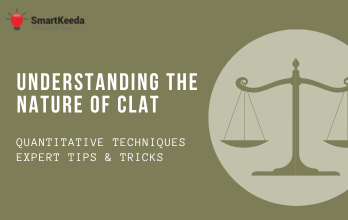
With over 60 thousand applicants vying for a mere 3361 seats across 22 National Law Universities (NLUs) each year, the competition in the CLAT exam is undeniably fierce. So, what sets apart the successful candidates from the rest? Among several factors, one prominent reason that cannot be overlooked is attempting Mock tests and Quizzes.
Quizzes and mock tests for CLAT play a crucial role in the preparation for the Common Law Admission Test (CLAT), as they serve as the ultimate bridge between hard work and success. CLAT mock tests provide an invaluable opportunity to gain a deeper understanding of the CLAT exam pattern, refine time management skills, gauge the level of CLAT preparation, identify strengths and weaknesses, and improve test-taking strategies.
In this blog, we will explore the top reasons why quizzes and mock tests are of utmost importance for cracking the CLAT exam and shed light on the multitude of benefits they offer to aspirants for CLAT preparation:
Assessing Knowledge and Understanding
While gaining conceptual knowledge is crucial for the CLAT exam, it is incomplete without putting that knowledge to the test. Merely studying and acquiring information may not be sufficient when facing the actual exam. It is through the process of engaging in mock tests and quizzes that you can actually identify the gaps in your understanding and improve your CLAT preparation.Uncover Question Patterns: After completing a topic, you may not know what specific types of questions may be asked from that topic. By practicing with mock tests, you expose yourself to a wide range of question types.
• Time Management Skills: Time management is crucial in the CLAT exam, where you have a limited time frame to answer a considerable number of questions. By attempting mock tests, you gain insights into how much time a particular question consumes.
• Skip Strategically: During the CLAT exam, you might encounter complex questions that are intentionally designed to be time-consuming. By practicing with mock tests, you can identify such questions and develop a skipping strategy, ensuring that you can attempt the maximum number of questions within the given time limit.
• Clarity of concepts: If you attempt a question incorrectly during a mock test, it serves as a red flag, indicating that there might be a lack of clarity on that particular topic. This awareness allows you to revisit those concepts, ensuring a better understanding of the concepts.
• Get Familiar with Pattern: By practicing with mock tests for CLAT, you become familiar with the instructions, question formats, and the overall marking scheme of the CLAT exam. This familiarity reduces the chances of making careless mistakes or misinterpreting questions.
Identifying Strengths and Weaknesses
Attempting a mock test for CLAT is undoubtedly a crucial step in preparing for the law entrance exam. However, simply attempting a mock test is not enough to ensure a strong performance. The main objective of a mock test is to identify your strengths and weaknesses. It is through a thorough evaluation of your performance that you can truly benefit from a mock test.The performance evaluation after a mock test allows you to identify specific areas of focus and adjust your study plan accordingly. Whether it's dedicating more time to challenging topics or refining your test-taking strategies or time management skills, analyzing your mock test performance provides valuable insights to enhance your overall CLAT preparation.
How to pinpoint weak areas for focused improvement?
Identifying weak areas is of utmost importance when it comes to achieving focused improvement. By thorough analysis of your performance in mock tests, you can identify specific topics where you exhibit lower proficiency.
To get the best analysis of your performance we recommend you attempt CLAT Mock Tests at Smartkeeda where the after-test analysis part is simply unmatched. At Smartkeeda, we offer incredibly thorough, error-free analytics reports on your performance in each CLAT mock test.
After completing a mock test for CLAT by Smartkeeda, it is essential to follow these steps in the "Solutions" section to flag your weak areas:
1. Review Incorrectly Marked Questions: Examine the solutions provided for the questions you answered incorrectly. Analyze whether the mistakes were due to calculation errors or conceptual misunderstandings.
2. Analyze Skipped Questions: Look at the solutions for the questions you skipped and consider the amount of time you spent on each. Also, check the questions that were skipped by the topper to save time.
3. Compare Time Spent on Incorrect Attempts: Note the amount of time you spent on questions that you answered incorrectly. Compare this with the time spent by the topper on the same questions. This comparison provides insight into time management and allows you to identify areas where you need to improve your speed and accuracy.
4. Evaluate Correct Attempts: Study the solutions for the questions you answered correctly. Look for alternative methods or more time-saving approaches to solve those questions. This allows you to refine your problem-solving strategies and optimize your efficiency in future exams.
5. Strong & Weak Areas: This tab displays the difficulty level of each question, your speed, accuracy, and your score in every topic. By analyzing this area, you can make a list of the topics where your topic strength is “Poor” and practice those topics using Smartkeeda CLAT Topic Tests .
Prioritizing study efforts based on individual strengths and weaknesses
After evaluating your performance in mock tests, it is essential to prioritize your study efforts refine your problem-solving skills during CLAT preparation. Smartkeeda offers subject-wise video lectures on YouTube channel LawEx by Smartkeeda for law aspirants preparing for the CLAT exam. The lectures cover a range of topics, including English Language, Current Affairs, General Knowledge, Legal Reasoning, Logical Reasoning, and Quantitative Techniques.
Once you have gained conceptual clarity through the subject-wise lectures, Smartkeeda provides CLAT Topic Tests that are specifically designed to assess your proficiency in each topic. At Smartkeeda you can attempt topic-wise quizzes for different CLAT topics such as Indian Constitution, Law of Torts, Law of Contracts, Criminal Law, Statements and Assumptions, Data Interpretation, Number System and Calculation. These tests allow you to apply your newly acquired knowledge and test your understanding of individual subjects in a focused manner and improve your CLAT preparation.
To access the CLAT Legal Reasoning Topic Tests, kindly click on the following links:
| Current Legal Comprehensions | Law of Contracts |
| Static Legal Comprehensions | Criminal Law |
| Indian Constitution | Family Law |
| Law of Torts | Miscellaneous |
Building Confidence and Time Management Skills
Time management is a crucial aspect of the CLAT 2025 exam, where candidates are required to attempt 120 questions within a span of 2 hours. The pressure to perform efficiently within a limited time frame can be challenging. However, effective time management is key to maximizing your score in CLAT 2025 exam.
The time management section of Smartkeeda CLAT mock tests helps you in doing so. It provides valuable insights into how you utilized your time during the exam. This section presents your time distribution for correct, incorrect, and skipped questions in a graphical format, making it easier to assess your performance in terms of time allocation.
By closely analyzing your time distribution, you can identify:
• Questions that should be attempted in the first cycle to gain confidence.
• Bonus questions that save you time.
• Time-consuming questions or topics that should be tried later.
• Questions that are easy to do but require more practice to save time.
• Touch-me-not questions that should be skipped at any cost.
After analyzing, you can take a “Full-length Reattempt” of your mock test for CLAT and approach the questions using the improved strategies you learned during the analysis session.
Monitoring Progress and Tracking Performance
Monitoring progress and tracking performance are essential components of CLAT preparation. The personalized performance graph prepared by Smartkeeda after each CLAT mock test offers a graphical representation of your overall performance as well as section-wise performance across multiple mock tests. This graph allows you to assess the consistency of your performance in terms of percentile, accuracy, speed, time management, and your ability to select and answer easy questions in CLAT mock tests.
Additionally, the "You vs You" comparison mode of Smartkeeda allows you to compare your previous performances with your latest performance. This feature provides a clear and concise understanding of your progress and improvement over time. By reviewing the performance graph, you can easily identify trends, improvements, or areas that require further attention.
Download the Free CLAT New Pattern Mock Test
Enhancing Problem-Solving and Analytical Skills
CLAT is an exam that heavily relies on passage-based questions, making strong analytical skills a critical factor for success. The ability to comprehend complex passages, extract relevant information, and apply logical reasoning is essential to excel in this exam. Regularly practicing CLAT 2025 mock tests and quizzes plays a pivotal role in developing these analytical skills.
The CLAT mock tests by Smartkeeda expose you to a wide range of passages and questions that may be presented in the CLAT exam, enabling you to practice analyzing and interpreting information under timed conditions. By consistently engaging in such mock tests and quizzes, you can sharpen your problem-solving abilities, improve your comprehension skills, and refine your logical reasoning skills for CLAT 2025 exam.
Attempt CLAT Reading Comprehension Quizzes here:
| Fact-based RCs | Tone and Theme based RCs |
| Inferences based RCs | Figure of Speech based RCs |
| Central Idea based RCs | Vocabulary based RCs |

Author : Saurabh
Greetings! I'm Saurabh, an aspiring writer fueled by a deep passion for self-discovery through the written word. Along my journey, I have stumbled upon the enchanting realm of blog writing, which has become my true calling. As an avid wordsmith, nothing brings me greater joy than imparting knowledge and assisting students in their preparation for competitive exams. I invite you to join me on this thrilling expedition as we venture into the vast ocean of possibilities that writing offers. Stay connected to receive invaluable insights and expert guidance in every blog post. Together, let's unlock our full potential and embark on this educational adventure that awaits us!
FAQ’s
Quizzes and mock tests are essential for CLAT preparation as they allow you to assess your readiness, identify areas for improvement, and help you adjust your study approach accordingly. These tests also familiarize you with the exam format, improve time management skills, and boost your confidence for the exam.
Quizzes and mock tests aid in improving time management skills by helping you identify time-consuming topics, allowing the focused practice, and enabling the development of a personalized approach that saves time during the exam.
Yes, quizzes and mock tests help familiarize candidates with the CLAT exam pattern as they simulate the actual exam format, enabling practice under similar conditions and enhancing preparedness.
Quizzes and mock tests enhance subject knowledge by presenting a variety of questions that can be asked from specific subjects, enabling you to revisit and reinforce your understanding of those topics. This comprehensive exposure to different question types helps deepen your knowledge, identify any gaps, and strengthen your grasp on the subject matter.
Yes! Quizzes and mock tests can significantly improve problem-solving abilities by providing opportunities to apply different logic, experiment with various approaches, and learn from the explanations provided, which offer alternative perspectives and insights.
Quizzes and mock tests are highly beneficial for developing a revision strategy as they allow you to revisit topics by directly attempting questions, eliminating the need to refer back to your books.





